Aon Focal, Dhá Focal… Teanga Beo
by Mary O’Connor
by Mary O’Connor
Scríofa i 2002:
Tá traidisiún na Gaeilge an-láidir agus beomhar sa scoil seo – Coláiste Dheasmhumhan agus roimh sin sa ghairmscoil. Freastalaíonn an cúrsa ar gach riachtanas an dalta faoi láthair na huaire.
De bharr an dul chun cinn mór atá déanta le blianta beaga anuas i modhanna múinte and teanga, le níos mó béime ar an dteanga labhartha agus ar an gcluastuiscint, tá foghlaim na teanga níos éasca agus níos siumúla ná mar a bhí. Tá na háiseanna éagsúla mar TG4, Raidió na Gaeltachta agus réimse mór núachtáin is irisí ag glacadh ról tábhachtach agus éifeachtach freisin.
Cé gur teanga ársa í an Gaeilge, tá sí beo anois leis na mílte bliain. Is cuid dá n-oidhreacht í agus tá a háit aici – ní hamháin ins an scoil ach i saol Sóisialta agus cultúrtha na tire agus go háirithe timpeall an cheantair seo.
Tá an dúiche mór thimpeall sáite i gceol traidisiúnta. Tá céilithe agus seisiún ceoil i ngach baile agus sráidbhaile. Cuireann sé iontas orainn go léir nuair a chloisimid fós an glaoch “Tá an Dreoilín chughainn͛ thuas i gCarrigchiarraí, Áth an tSléibhte nó Tuar na Fola”!
Lá le Stiofáin, tá Ceoltas Ceoltóirí Eireannn an ghníomhach anseo agus tá an chuid ceoltóirí óga ag freastal ar an scoil a ghlacann páirt ins na Feiseanna agus Comórtais i rith na bliana. Táimíd an-bhróidiúl as ár bhfoirne Peile, iománaíochta, camógaíochta sóisearacha agus sinsearacha sa scoil agus tá cuid acu ar fhoirne an Chontae. Luimneach abú!
Ar an ábhar sin, táim an-dóchasach I dtaobh na Gaeile agus gach a bhaineann leí sa Mhilaois Nua. Ceapain go bhfuil tódhchaí torthúil taitneamhach i ndan di. Is teanga álainn í. Ní dhéanfaimís faille uirthi!
Mary O’Connor

Elizabeth Blackwell (Geography) and Mary O’Connor (Gaeilge)
(image 0071)
The Relevance of Geography
by Elizabeth Blackwell
by Elizabeth Blackwell
Study of the present Geography syllabis can make pupils much more aware of the environment around them. Since not only are they studying physical geography but human geography also.
The student is learning not just about the world in which we live but how we live, how we adapt to the environment and how we care for our environment. Our world today seems much smaller place than a few years ago with transport, technology and communication.
We must learn to protect our environment, the air, the rivers, the sea, the land. We must become aware of how the actions of man in a relatively short space of time can cause irreversible damage.
Hopefully, we will understand a need for a balance to be kept between progress and protection. If students are from a rural area, they can better understand why a particular farming system is to be found in their locality, and how farm produce can provide the raw materials for the development of food sector industry in the locality.
The student from the urban environment can see the practical effects of textbook terms eg population growth, industrial growth, social housing problems, water supply problems, traffic congestion, provision of recreational space in their own area, and how these problems have or are being tackled.
The world has a limit to its resources, a limit to the amount of people it can support, a limit to the amount of waste it can tolerate. Geography discusses modern concepts like the need to develop alternative energy sources, better conservation, the use of existing and dwindling resources, Global Warming and the Ozone Layer.
A study of geography, when studying foreign countries can encourage and develop a wish to travel and see in reality what appears as facts and illustrations in a textbook. Finally Geography not only helps the pupil to not only know about the world around them but also to understand the constantly changing facts of our world.
Elizabeth Blackwell
This article presented in 1984 was never more apt than at present.
Serving the Locality
by Pat Hartnett
by Pat Hartnett
Traditionally the vocational sector was the main supply route for apprentices in every type of industry. In this regard Newcastle West Vocational School was always in the premier league. For the boys woodwork, metalwork, and science were the most relevant subjects and for the girls it was commerce and home economics.
The influence of many rural science teachers helped those young farmers as they brought farming into a more modern era. Newcastle West Vocational School first principal, the late Eddie O’Connell, was a huge driving force in encouraging the students to better themselves.
This in turn led to many starting their own companies and being leaders in their communities. The students qualified for an apprenticeship when they had the group certificate. Similarly the rural science course which had a strong practical gardening section was educating many young farmers and allowing them to work productively back on their own family farm.
Newcastle West Vocational School followed this line to a huge extent. In fact, Newcastle West Vocational School probably had an above average record in these areas. This was due in no small way to one of its former headmasters, the late Eddie O’Connell.
Eddie taught science and was headmaster for years, from 1935 to August 1972. He had a tremendous interest in rural life and particularly in the parishes around Newcastle West.
Eddie was a great “forward thinker” at a time when change was taking place at a slow rate. Looking back now on his philosophy on life, it is easy to see that he was “a man ahead of his time”. This type of thinking instilled a confidence and self-belief in the students, which encouraged many to go on and set up business on their own.
Some of these families are now second or even third generation successes. For those who stayed at home to farm, they became prominent members of Macra na Feirme, IFA, ICMSA and their co-op’s or PLC’s: Aherns, Barretts, Bourkes, Breens, Brouder, Burke, Careys, Collins, Conways, Copses, Cussens, Corbetts, Danahers, Dalys, Dees, Delee, Doherty, Dowling, Dwyers, Fitzgearlds, Fitzmaurices, Flynns, Foleys, Guina, Healys, Herberts, Horgans, Hoynes, Kellys, Kenneallys, Kirwins, Lanes, Leahy, Leens, Listons, Masseys, McAuliffe, McCarthys, McMahon, Moloneys, Mortells, Murphys, Nashes, Nix, Nolans, Normoyles, O’Briens, O’Connors, O’Connell, O’Dohertys, O’Donnells, O’Keefees, O’Sullivans, O’Gradys, Quaids, Quilligans, Shanahans, Sheahans, Sheehans, Shines, Whites, Woulfes… The list of achievers is endless, in fact we would have to go through the full register!
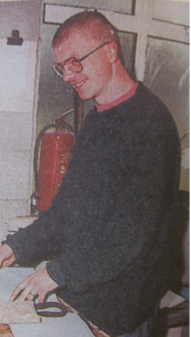
Timmy Cunningham
(image 0114)

David O’Doherty and ______
(image 0115)
Newcastle West Vocational School was lucky that the men and women of the staff who followed on, all had such an influence on the students that passed through. When the big changes in society began to take place in more recent years, it was no surprise to see so many former students being at the forefront of some of the great developments that took place and are continuing to take place in the locality.
The transition from Newcastle West Vocational School to Desmond College has not changed the dedication of the staff or dimmed the outlook of the students. Everybody who was part of Newcastle West Vocational School can look with pride in what they have achieved and the success of their former pupils.

Monagea I.C.A. members, Anne Doody, Nora Shanahan, and Agatha Downes, displaying their certificates from the CBF (Irish Livestock and Meat Board) after concluding the course in Newcastle West Vocational School.
Also in photo: Frank Burke, butcher and Pat Harnett, teacher.
(image 0116)

Mr. Tony Greed, butcher, looking on during the presentation of C.B.F. Certificates to May O’Connor, Castlemahon by Margot McMahon, Reg. Home Economics, C.B.F. Present also to receive her certificate from C.B.F. was Eva Brosnan, Home Economics, V.E.C., Newcastle West. This course was organised jointly by C.B.F. and V.E.C., Newcastle West.
(image 0117)

Geraldine Kelleher B.O.I. N.C.W. Officer presenting the Student of the Year Award to Breda Downes. Also in photo are Pat Harnett, teacher, and Keith Massey, Certificate holder.
(image 0118)
Woodwork
by Pat O’Connor
by Pat O’Connor
I, Pat O’Connor, Bruff, taught in Newcastle West from 1973 to 2011. In 1973, Michael Kenneally Senior and Junior, Shanagolden also taught Woodwork in the school.
At this time, the Group Cert was being phased out and being replaced by the Intermediate Cert – a significant part of this course contained a study of the theory of woodwork. Many students would have preferred if it had remained practical work only.
The same as in many other subjects, the Intermediate Cert was required, as a preparation for the Leaving Certificate which was being introduced in 1974. Woodwork was incorporated into the Construction Studies Course for Leaving Certificate Programme. Michael Slattery, Ballyduff, Co. Kerry joined the staff in 1974 and remained working in Newcastle West until 1974- 2001.
The word ‘gentleman’, ‘stylish’ and ‘tasteful’ were synonymous with him. The use of his elaborate working drawings with coloured chalk on the blackboard were a joy to look at. Good craftsmanship which he practised and taught, came easy to him, as it was in his family for generations ~ ‘a chip of an old block’, and he brought a fresh and modern approach to the items that he designed with his classes.
He had an impressive collection of books on craft, design and drawing, so work of this nature was a labour of love for Michael. Craft is a skill that is a man’s own possession. There is always a period where he has to learn.
Not even the most powerful of instincts can succeed without some guidance and a painstaking amount of practice.
Chips from the Chisel, Woodworker Magazine.

Michael Slattery (centre) on his retirement party with Martin McNamara and Pat O’Connor. Another teacher, John Considine, Clare, joined the woodwork teaching staff in 1975. For a number of years these three teachers shared Woodwork, Construction Studies, Mechanical Drawing and Technical Drawing for the Leaving Certificate.
(image 0151)

John Considine in the Construction Studies room.
(image 0152)
After a few years, Michael Scanlon from Clare replaced John Considine. He in turn was replaced by Dan Culhane from Glin. Dan had been a student at Newcastle West Vocational School in the early 70s and returned there to teach Woodwork.

(image 0153)
Remembering the Vocational School
by Dan Culhane
by Dan Culhane
Dan wrote:
The teachers in the Vocational School had a positive influence on me and my future. Martin McNamara taught me Science. I travelled to school even day with Martin, he always had a great sense of humour, light-hearted attitude to life and was a great friend to me.
I remember him as being an excellent teacher with the ability to bring out the best in his students. Richard Barry taught Irish and English and really impressed us with his command of the English language. He also conveyed a great love of Irish.
Jim Kelleher was the Maths teacher; he had a real understanding of Maths and simplified the most difficult of problems. Liam Higgins R.I.P. was the metalwork and drawing teacher. He excelled in his subject areas. Pat Toomey R.I.P. taught us woodwork and always stressed the importance of producing the best possible joint. I always had a great love of wood after being taught by him.
The Principal Mr. Collery R.I.P. worked diligently to create a good educational environment in the school. Having completed my term in school I served my apprenticeship as a carpenter with Denis O’Grady. I then moved to Aughinish and from there I went to college to train as a woodwork teacher. I then went full circle and returned to the same school as a teacher.
Dan Culhane
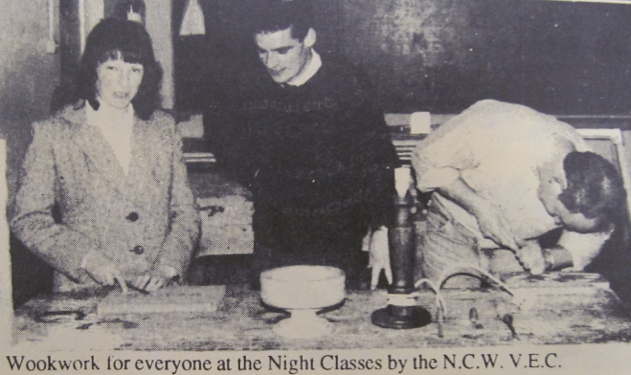
Centre: Denis Donovan , woodwork tutor.
(image 0154)
In 2001, Colm Lowe, from County Limerick, began working in the school. Colm’s experience in marking exams with the Department of Education is a huge asset for his students. In preparation for the T4 programme, Colm took responsibility for the design and layout of the T4 Computer Room.
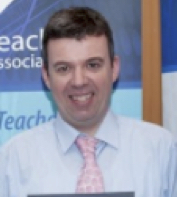
(image 0156)
Martin Burke, Tipperary, began teaching in the school in 2011.

Martin Bourke
(image 0157)
A number of past students now qualified as Woodwork teachers among them are Noel O’Grady, Michael Flynn, Denis Donovan, Michael Hennessy, Eamon Heffernan and Mr. Greany from Carrigkerry as a metalwork teacher.
Metalwork
by Liam Higgins
by Liam Higgins
Liam began his teaching career in Newcastle West and retired in 1981.
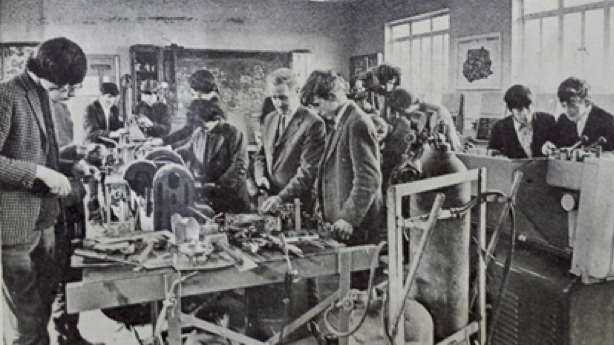
Metalwork Room with Mr. Liam Higgins and his industrious students in 1972
(image 0158)
The following piece written by Liam Higgins (metal work teacher for many years in the Vocational school) expresses the humorous and adventurous way that he approached his subject:
I often think that a good teacher is one who has made more errors that others. I come from a family who are good at painting and sculpture and I was in unfair competition.
My first serious muddle was when I tried to make a mask of my brother’s face. I covered his face with olive oil, and put scraps of newspaper over the oil. I put large straws in his nose to help him breathe. I then covered his face with plaster of paris, hoping to achieve an image.
My brother lost his eyebrows, my father his temper, and I my confidence.
I did learn from my errors, and I did make some difficult castings later, people came to me to make things, and I again gained confidence. I eventually became a metal work teacher under the Co. Limerick Vocational Committee.
I found out that boys worked well with background noise, they hated repetition and loved new ideas. I truly wanted now to show that art was more than picture painting, and that it should properly mean all handwork done with interest and care for quality.
Art is competent and worthy work. Beautiful work is not some strange phenomena, only to be attained by a genius in a dream. It is present in its due degree in all happy and skilful craftsmanship, it is the evidence of the workers triumph over mere brute labour.
Work which may be transformed by discipline and touched by beauty is the most primary and universal means of human expression. It is not a burden or a curse but rather one of the greatest things in life.
The question is who is the man who taught you most? You could be wrong, he just taught you to think about things.
My Work
Let me do my work from day to day,
In field or forest or desk or loom,
In roaring market place or tranquil room;
Let me but find in my heart to say,
When vagrant wishes beckon me astray;
This is my work; my blessing, not my doom;
Of all who live,
I am the one by whom this work can best be done in the right way.
Metalwork
by Michael Heffernan(teacher 1978-2002)
by Michael Heffernan(teacher 1978-2002)
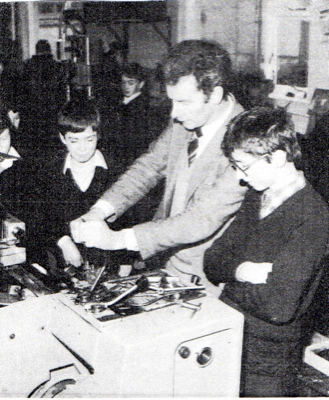
Michael Heffernan with students from the Metalwork Class of 1983-1984
(image 0159)
I, being a metalwork teacher have a strong sense of the importance of technical subjects. I believe that all children should be exposed to them because of the different beneficial effects they can have.
What child, who produces something in the woodwork room, with the smell of wood shavings and the beautiful smooth finish of the wood, cannot, but feel uplifted by the experience.
Likewise, in engineering, after applying knowledge and skill to complete a project, the student must feel a sense of achievement and self-worth. The T4 Programme (originally known as technical drawing) has a special language that can transmit idea, where words fail, where a few lines in a sheet can play gymnastics with your mind.
Would you deny a child the chance to experience this?
I do admit that not all students have the aptitude for technical subjects, that’s why there should be a wide choice of subjects available as possible. In the early 60͛s group cert metalwork was a 2 year course. Basic skills in a number of engineeringareas were taught. Fitting skills such as, accurate marking out and shaping of a piece of metal, by cutting with a hacksaw, cutting with a chisel, drilling and filing, were the foundation of which further skills were based.
Cutting bending and soldering of light ferrous and non-Ferris metals, forging of hot metal to produce flat sections or points, turning parallel or tapered pieces on a lathe, threading bars or making nuts, all these were part of the syllabus.
Later when the inter-cert was introduced, working on plastic as well as metals was included. Theory was added to the course. Production of Ferris metals, composition and properties of Ferris and non-Ferris metals, cutting tool geometry, basic electricity, health and safety all were studied.
Engineering was introduced at Leaving Cert level in the early 70s. Practice and theory formed part of the course. Practical skills were further developed, and other skills like electric welding, braising using oxy-acetylene welding, milling and C.N.C. machining were added later. Theory covered a wide range of topics.
Project work was first introduced at Leaving Cert level and later at Junior Cert. This involved the student researching, designing and making projects, to satisfy a brief submitted by the Department of Education. This changed the way students learned, helping them prepare for third level and later life.
It was an honour for me to work in Newcastle West Vocational School among a staff that were the salt of the earth and students that were honest, decent and hardworking.
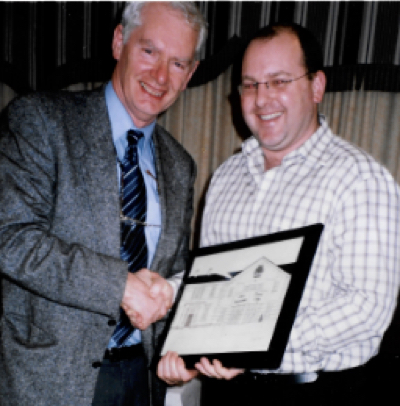
Tom Brynes presenting a drawing of the schools to retiring metal work teacher Michael Heffernan.
Tom, a Carlow man, replaced Mike as metal work teacher.
(image 0160)
John Cooke taught metalwork in the school for a few years before 1978. Jack Brislane worked between Abbeyfeale and NCW for a few years in the 70s. Tom Frawley also taught here.
A past pupil and a good football and soccer player Mike Daly taught here from 1985-94 and was also involved as a student and mentor in the Young Scientist Competitions, he is now teaching in Askeaton.
Ann Hannon’s Call in 1984
Special Education is often thought of as something that is provided only in special schools. This is quite untrue. Special Education is simply education that is specially adapted to meet the child’s needs.
If these needs can be met within the ordinary primary or post primary school, all the better. There is a need for help for approximately 16% of students. This will require extending the number of training courses available to teachers. There is a world waiting to be born under our footsteps.
A Very Special Class
by Ann Hannon, 2014
by Ann Hannon, 2014
It seems just like yesterday I arrived at the Vocational School, a young inexperienced teacher to meet my new Principal and to be introduced to the Special Class. We climbed the stairs to Room 2 opposite Eileen O’Sullivan’s art room. It was 1983, and as they say the rest is history.
Room 2 was our base room, it served as a Domestic Science room for many years and still retained an assortment of cookers, a huge sink, an old fireplace and stove and pulleys to assist in drying tea towels etc. The pantry was at the back of the room and still well stocked with pots and pans.
Well it was a memorable occasion for all concerned and my first meeting with the boys and girls from such far flung places as Kilmallock, Abbeyfeale, Askeaton and Croom. Both the class and I survived and went on to develop over the years into a mini school, with many memorable characters, and the addition of teachers like Maria Shanahan and Seán Shiels. We progressed from the kitchen to a music room, then a prefab and eventually into our beautiful new classroom Desmond College.
Over the years we have tried to accommodate the different skills and talents of our students by offering a wide range of subjects from Hairdressing, Irish Dancing under the guidance of one of our past pupils Séamus O͛ Sullivan, Speech and Drama with Mrs. Purcell and in more recent years Horticulture thanks to Heather McCarthy and Donal Cooper.
Our class was always well represented in school teams – hurling, football and recently in soccer and rugby, and brought honours to the school in boxing and the track. Over 200 pupils have passed through the class. Many have gone on to distinguish themselves in catering, hairdressing, horticulture and upholstery. Others joined the Brothers of Charity in their workshop. Nowadays, more and more of our pupils complete their Certificate exams, with 11 due to sit Junior Certificate and 6 Leaving Certificate Applied in 2015. Every child is offered an opportunity to continue further training on graduating from the school.
It is always such a pleasure when past pupils return to talk to the class and visit their teacher; to sell their wares like John Noonan, or to proudly display a Special Olympics medal like Brian O’Sullivan, or simply to say hello. Down through the years we’ve had some great adventures on school trips and tours. We climbed hills and visited castles. We͛’ve seen dungeons and dolmens thanks to Stephen Goulding. We wrote books, visited the Zoo and many of the class have visited Lourdes thanks to IHCPT.
In 2013, we again responded to the needs of the community when we were successful in our application for a Special Class for children with Autism. In 2014, this became 2 classes under the management of Miriam Nelligan and Margaret O’Connor, pioneers in this field. These classes will benefit so many children especially in the area of social and life skills, and will eventually be accommodated in a beautiful new building which has already been sanctioned by the Department of Education.
As our numbers have grown, so has our allocation of Special Needs Assistants. We are lucky to have six fantastic ladies. It all began with Bernie, Mona, Maeve and Anne Grant. In recent years we have been fortunate enough to add Anne, Catherine and Marie to our team. These women are a wonderful addition to our class and our school, quietly supporting both teachers and pupils on a daily basis.
I firmly believe that a school can welcome all students regardless of ability, treat these children with respect and encourage them to reach their full potential, is a kind of school I can be proud to be associated with. All credit is due to our teachers and principals, past and present, that we continue to go from strength to strength in the area of provision for Special Needs pupils.
I feel lucky and privileged to have worked with dedicated teachers and wonderful students and parents who continue to inspire me on a daily basis. People say that the job has changed but I can assure you it is never boring, no two days or pupils are the same. I have no fear for the future of our Special Class and pupils in Desmond College. It is in the safe hands of a dedicated team headed by Vourneen and Liz and is sure to continue its noble tradition.
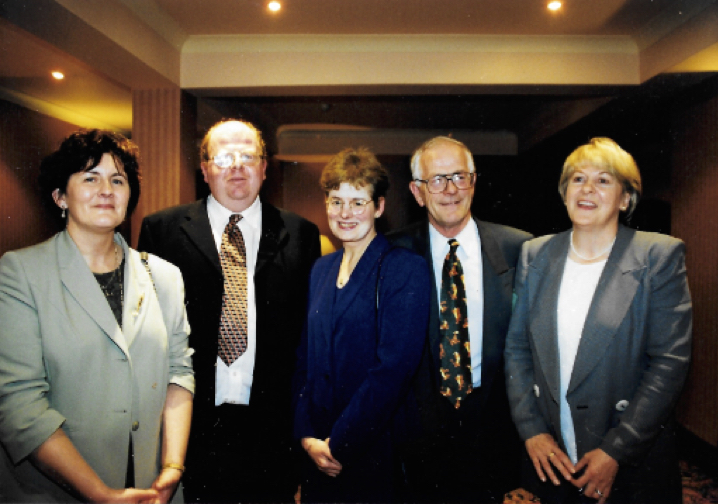
Marie Shanahan, John Meehan, Ann Hannon, Mike Nash and Mary O’Connor.
(image 0161)
Happy days spent in the TECH Newcastle West 1988–2000
by Michael, Séamus, Bridget and Patrick Flynn
by Michael, Séamus, Bridget and Patrick Flynn
No matter how clichéd it sounds school was the best days of our lives. For all of our family this was made possible because the TECH (now Desmond College) was a unique place to learn with lots of positive features – great friends, excellent teachers and a caring learning environment.
Nowadays when we all get together at home as a family, it is inevitable that we will eventually start to talk about our school days. Memories flood back into our heads and we start talking about the different friendships and fun we shared and the educational experiences we encountered. Here we will each share what made the TECH unique and special for each of us.

Michael Flynn 1988-1994
(image 0123)
Michael Flynn, 1988-1994
When I joined the college in 1988 I had no idea what secondary school would be like. To my surprise it was both exciting and challenging all at the same time. There were many excellent and inspirational teachers that gave us the best education we could receive.
As budding students, at the time, we did not fully understand or appreciate that. In mentioning the following teachers I don’t want to omit anyone but from my perspective these teachers inspired me and made me the type of person I am today.
Firstly, Ms. Lenihan was an excellent teacher whose style of teaching and command of her subject awed me. She was getting us to think of life from a European perspective. We practiced our French accents every day in her class and I loved doing this. The infamous exchange programme with Chartres De Bretagne was an amazing experience for me and made me realise that there was life outside of Limerick.
I had an epiphany in that I realised that ships, planes and trains were running all over the world everyday as we went to school. This experience instilled in me a love of all things French which continues to this day. I later went on the complete a diploma from the Alliance Francais in Dublin.
I remember Ms. Gavin’s first day teaching in the TECH. She was a very enthusiastic teacher and talked openly about many issues even ones we would find it difficult to talk to our parents about. She also had a very distinctive style of teaching enabling her classes to debate moral issues in a very open and realistic manner. She eventually helped me to make my career choice to become a teacher of Religious Education.
Ms. Blackwell gave generous of her time after school so that I could study Geography on my own. This again showed her commitment and passion for her subject with amazingly detailed explanations of natural world phenomena. I find myself today on a holiday explaining a sea-breeze or showing a U-shaped glacial valley and remember her explanations fondly.
Mr. McNamara and Mr. Barry were constant presences in the school as management and it was obvious that they ran a great school efficiently with the resources available to them. Even though I did not play sport and was not very good at the practical subjects I felt really welcome and part of the TECH NCW.
I am so proud to have the TECH NCW as my alma mater and have the crest from my school jumper safely tucked away. The window of the castle on that crest has become a symbol for me of all that my school days were – a window through which I filtered my world – a world full of values such as endeavouring to do one’s best, making an honest effort and always striving to be the best that one can be.
Bridget Flynn, 1991-1997
For me, my friends were very important in secondary school. I have many memories and here are a few of the teachers that made an impression on me. Mr. McNamara as a principal was very approachable. He was very honest in pointing out areas you needed to improve on and gave me great advice on how to study.
The one teacher that could always make me laugh was Mr. Harnett. He was very encouraging and his ability to make us laugh made learning less of a chore. Science was a class I looked forward to every week.
Mr. Johnston, the guidance councillor, helped me to choose my career as a nurse. The French exchange programme was an exciting trip. I loved meeting my French family and experiencing French culture first hand. Even to this day the few French words I remember come in handy in work with some French patients I have been caring for.
In Home Economics, Ms. Glendon had a balanced teaching approach – which helped us to learn about all aspects of life – in particular, I remember different cooking and cleaning methods, vast amounts of knowledge on our anatomy and how to design kitchen spaces/rooms.
All these areas help me in my future career despite burning a few cakes along the way. Many of them relate directly to my career.
Patrick Flynn, 1993-1998
I really liked going to the TECH NCW for different reasons to Michael, Bridget and Seamus. I loved the practical subjects. In particular, woodwork with Mr. Dan Culhane, metalwork with Mr. Michael Heffernan and technical drawing with Mr. Pat O’Connor showed me a very clear way of learning. I enjoyed making a drawing plan of an object and then using various tools to make that object.
Sitting down learning didn’t appeal to me in the same way as doing things in the practical subjects. The extracurricular activities of the school interested me also. I have always had a love for the GAA–hurling and Gaelic football. This was no different when I joined secondary school.
My coaches were Mr. Richard Barry, Mr. Jim Kelleher and Mr. Pat O’Connor. They pushed us to be the best team that we could possibly be and by doing that we won a number of Munster titles.
Seamus Flynn, 1995–2000
The most significant memory for me about school is sport. I enjoyed the fun we had playing on the school teams and the time off class to represent the school. The feeling of playing a game and winning was exhilarating.
I remember the three Munster Finals that we were involved in and won for the college. In particular I remember my brother Patrick, Donal Horgan and Martin Hennessey as great players. We had a great time. I too, like my brother Patrick remembers the good coaches we had – Mr. Richard Barry, Mr. Jim Kelleher and Mr. Pat O’Connor.
Their pep talks at half time were memorable even when we were losing. Their confidence in us helped us to win those matches. So…There are so many memories to remember, we had to be very selective. Our accounts only give a brief glimpse into our time at school.
As you can see the TECH NCW was a fine place to get an education and even though our family’s involvement spanned just over a decade, the school still had the same values throughout our time there offering a thorough excellent education to all its students.
We would like to take this opportunity to thank all the staff of the school for helping us to achieve our potential.
Today…
Michael is a Deputy Principal in St. Kevin’s Community College in Dublin.
Bridget is a senior staff nurse in an intensive Care Unit with a speciality in burns care in Chelsea/West Minister Hospital in London.
Patrick is working for the Zimmer pharmaceutical company in Shannon.
Seamus is a Manager in Dooley’s Supervalu Newcastle West.
From The Technical School to the University Of Life
by John Dowling
by John Dowling

John Dowling
(image 0130)
Having attended the technical school in NCW and completed Group Cert, Enter Cert and Leaving Cert I was ready to enter the work place. But my career path was to be something different from what the actual subjects that I took, had prepared me for e.g. woodwork, metal work and other various subjects. In 1976 the VEC as it was known then made available a summer course at the Technical school.
AnCo Summer Holiday Course for Students 1976 (Limerick Leader)
Sixty students from the area commenced the above course at the Vocational School. They will study such subjects as business organisation, industrial legislation, taxation, office use, typing, worker psychology and work place behaviour.
Mr. Eugene Gilligan of AnCo told the Echo that the programme was sufficiently flexible to take account of local requirement.
1976 as I remember was also the year of the bank strike and as we went through all the subjects mentioned above, the foundations of my career path were beginning to take shape. Even though I did not know it at that stage.
As I used to work in local bars at that time I made arrangements to have our AnCo cheques cashed each week. So we were able to get around the bank strike and make sure we had money to spend. My first fulltime job was in Dublin for about 18 months, fantastic experience.
But I was following events at home and saw that Aughinish Alumina Plant was starting construction and I duly got a job there with ACL the management contractors.
Even though I would say I wasn͛t great at mechanical drawing at school I quickly became proficient in reading and understanding all types of drawings, concrete, mechanical, steel and piping, under the guidance of engineering staff.
Again during this period of employment the Technical school advertised a two year night course, it led to a certificate in Supervisory Management issued by the Irish Management Institute (IMI). This course was broken down into modules covering the basics of supervision in the work place.
This course caught my attention and I duly signed up.
Michael Healy who was my previous English Teacher was lecturer and was a great source of material and practical advice. This course was to be the catalyst for the future.
I duly got a supervisory position on the construction site and then went on to work for the Aughinish Alumina company itself. I left after a year and half and spent another 18months managing a small construction company. Having completed the IMI course in Supervisory Management, I felt this area was my forte and I must try and find a career in it.
Around that time Verbatim Computer Company was advertising for production supervisors in Raheen. This American Company was a high volume manufacturing site, making floppy discs for the computer industry.
My first interview was unsuccessful, but about 10months later they advertised again, I re applied and was successful this time. This position was the real deal and drew on all I had learned up to then in management techniques.
I spent 11 years there and managed various shifts. It was a non-union plant, where most of the workface were women, so there was a great deal of management skills required.
During my time there the company sent me to the IMI where I completed a Diploma in Production Management. This course made a huge difference to my career as it exposed me to real management skills in all key areas. As all products have a diminishing life cycle, after 11yrs I figured it was time to move on.
I had set up a company called Shanagarry Greyhound Products with my wife Kay who incidentally had also completed the IMI Supervisory Management course. We also opened up a pet shop in the square, NCW. Little did I know when I was going to the Courtney School and later the Technical School that we would buy our present premises opposite the Court House.
Through this piece I have tried to show a thread from the first initial course provided by AnCo through the technical school, the IMI Supervisory management course and culminating in the Diploma in Production Management course in Dublin to starting my own business.
The initial provision of these courses put me on a path which suited me as an individual and helped me have a confidence in myself.
John Dowling
